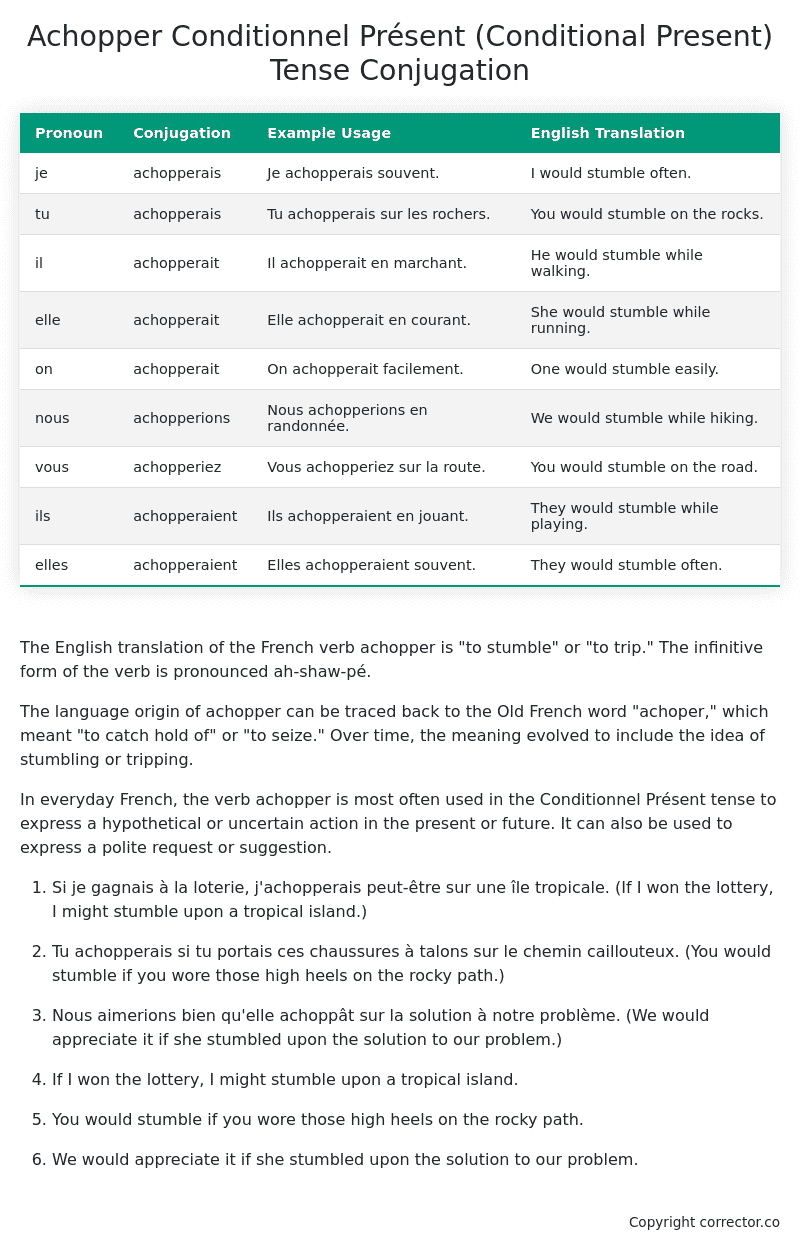Conditionnel Présent (Conditional Present) Tense Conjugation of the French Verb achopper
Introduction to the verb achopper
The English translation of the French verb achopper is “to stumble” or “to trip.” The infinitive form of the verb is pronounced ah-shaw-pé.
The language origin of achopper can be traced back to the Old French word “achoper,” which meant “to catch hold of” or “to seize.” Over time, the meaning evolved to include the idea of stumbling or tripping.
In everyday French, the verb achopper is most often used in the Conditionnel Présent tense to express a hypothetical or uncertain action in the present or future. It can also be used to express a polite request or suggestion.
-
Si je gagnais à la loterie, j’achopperais peut-être sur une île tropicale. (If I won the lottery, I might stumble upon a tropical island.)
-
Tu achopperais si tu portais ces chaussures à talons sur le chemin caillouteux. (You would stumble if you wore those high heels on the rocky path.)
-
Nous aimerions bien qu’elle achoppât sur la solution à notre problème. (We would appreciate it if she stumbled upon the solution to our problem.)
-
If I won the lottery, I might stumble upon a tropical island.
-
You would stumble if you wore those high heels on the rocky path.
-
We would appreciate it if she stumbled upon the solution to our problem.
Table of the Conditionnel Présent (Conditional Present) Tense Conjugation of achopper
| Pronoun | Conjugation | Example Usage | English Translation |
|---|---|---|---|
| je | achopperais | Je achopperais souvent. | I would stumble often. |
| tu | achopperais | Tu achopperais sur les rochers. | You would stumble on the rocks. |
| il | achopperait | Il achopperait en marchant. | He would stumble while walking. |
| elle | achopperait | Elle achopperait en courant. | She would stumble while running. |
| on | achopperait | On achopperait facilement. | One would stumble easily. |
| nous | achopperions | Nous achopperions en randonnée. | We would stumble while hiking. |
| vous | achopperiez | Vous achopperiez sur la route. | You would stumble on the road. |
| ils | achopperaient | Ils achopperaient en jouant. | They would stumble while playing. |
| elles | achopperaient | Elles achopperaient souvent. | They would stumble often. |
Other Conjugations for Achopper.
Le Present (Present Tense) Conjugation of the French Verb achopper
Imparfait (Imperfect) Tense Conjugation of the French Verb achopper
Passé Simple (Simple Past) Tense Conjugation of the French Verb achopper
Passé Composé (Present Perfect) Tense Conjugation of the French Verb achopper
Futur Simple (Simple Future) Tense Conjugation of the French Verb achopper
Futur Proche (Near Future) Tense Conjugation of the French Verb achopper
Plus-que-parfait (Pluperfect) Tense Conjugation of the French Verb achopper
Passé Antérieur (Past Anterior) Tense Conjugation of the French Verb achopper
Futur Antérieur (Future Anterior) Tense Conjugation of the French Verb achopper
Subjonctif Présent (Subjunctive Present) Tense Conjugation of the French Verb achopper
Subjonctif Passé (Subjunctive Past) Tense Conjugation of the French Verb achopper
Subjonctif Imparfait (Subjunctive Imperfect) Tense Conjugation of the French Verb achopper
Subjonctif Plus-que-parfait (Subjunctive Pluperfect) Tense Conjugation of the French Verb achopper
Conditionnel Présent (Conditional Present) Tense Conjugation of the French Verb achopper (this article)
Conditionnel Passé (Conditional Past) Tense Conjugation of the French Verb achopper
L’impératif Présent (Imperative Present) Tense Conjugation of the French Verb achopper
L’infinitif Présent (Infinitive Present) Tense Conjugation of the French Verb achopper
Struggling with French verbs or the language in general? Why not use our free French Grammar Checker – no registration required!
Get a FREE Download Study Sheet of this Conjugation 🔥
Simply right click the image below, click “save image” and get your free reference for the achopper Conditionnel Présent tense conjugation!

Achopper – About the French Conditionnel Présent (Conditional Present) Tense
Formation
Common Everyday Usage Patterns
Expressing Polite Requests
Expressing Hypothetical Situations
Expressing Doubt or Uncertainty
Interactions with Other Tenses
Present Tense
Past Tense
Future Tense
Conditional Perfect
Summary
Want More?
I hope you enjoyed this article on the verb achopper. Still in a learning mood? Check out another TOTALLY random French verb conjugation!


